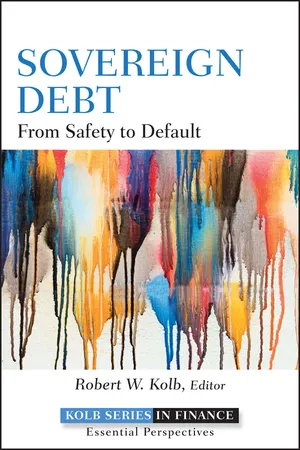Debt Default
Debt default occurs when a borrower fails to make scheduled payments on a debt, such as a loan or bond. This can lead to serious consequences, including damage to the borrower's credit rating, legal action by the lender, and potential financial instability. In the context of sovereign debt, default can have widespread economic implications for the country and its creditors.
6 Key excerpts on "Debt Default"
- eBook - ePub
Sovereign Debt
From Safety to Default
- Rob Quail, Robert W. Kolb(Authors)
- 2011(Publication Date)
- Wiley(Publisher)
...In fact, a sovereign that is emerging from a financial crisis signals its intention to become a creditworthy borrower by making a commitment to repay through the adoption of sound domestic macroeconomic policies and signals its ability to repay foreign debt through indicators of external soundness. Finally, the higher the international liquidity conditions, as proxied by low yields on U.S. Treasury debt instruments, the more likely investors are to lend. In fact, recent evidence confirms the view that creditors evaluate the case to resume lending on the basis of their expected returns in the context of the global liquidity cycle. Foreign investors evaluate whether to resume lending on the basis of the expected rate of return of their investment subject to the international liquidity conditions. Here, following the lead of Zanforlin (2007), the aim is to explain which set of macroeconomic indicators increases the likelihood that a sovereign emerging from a crisis will regain its ability to borrow from international capital markets. WHAT DOES THE EVIDENCE SAY? A default is typically an episode in which an obligor fails to meet a principal or interest payment on the due date, or within the specified grace period, contained in the original terms of the debt issue. In particular, in the case of local and foreign currency bonds, notes, and bills, each issuer’s debt is considered in default when either scheduled debt service is not made on the due date or when an exchange offer of new debt contains less favorable terms than the original issue; and in the case of bank loans, when either scheduled debt service is not made on the due date or a rescheduling of principal or interest is agreed to by creditors at less favorable terms than the original loan...
- eBook - ePub
- Johnna Montgomerie(Author)
- 2019(Publication Date)
- Polity(Publisher)
...We can see the impact of the debt economy in the harm inflicted on people by the 2008 financial crisis and by the ensuing period of austerity, which continues into the present day. The debt economy is in a vice grip of countervailing forces. The forces of personally experienced indebtedness are refracted onto the national economy and from there onto the global financial system. Debt has so many entanglements in everyday life that there is no path out of the financial crisis that will not induce yet another financial crisis, bound to create new forms of harm and insecurity. For example, if every person struggling with debt decided to pay down their debts, the national economy would be plunged into depression, the global economy following closely behind. However, if every person struggling with debt continues to take on more debt to maintain his or her standard of living, soon there will be rising insolvency rates. Currently most households keep up their debt repayments. However, by doing so, they are robbing the economy of its vitality by regularly remitting a growing portion of their present-day income to pay debts that have fuelled past economic activity: these payments are thousands of small pinpricks that bleed the economy, and these are the underlying cause of the entrenched economic malaise in Anglo-America. If, or when, for whatever reason, the same people who are today able to service their debts become unable to make these regular repayments, a worse scenario unfolds. Rising default rates on any one of the many types of loans that households have add to the portfolio of non-performing loans on bank balance sheets. As the 2008 financial crisis revealed, the elaborate network of financial claims flowing through the global financial system is vulnerable to default on even small-scale retail loans, as exemplified in the United States subprime mortgage loans...
- eBook - ePub
Fear and Greed
Investment risks and opportunities in a turbulent world
- Nicolas Sarkis(Author)
- 2012(Publication Date)
- Harriman House(Publisher)
...Chapter 5: Dread, Denial and Default The sense of dread beforehand is often worse than the deed itself. That was certainly true in the case of Greece defaulting on its debts. The prospect of Greece failing to meet its obligations spooked financial markets repeatedly from 2010 onwards. However, once it was actually confirmed in March 2012 that the country would not repay its creditors in full, the markets barely reacted at all. Even so, while the ultimate response may have been gentle, this is not to say that sovereign Debt Defaults are in any way painless. There was nothing novel about Greece’s default. Sovereign nations have done exactly the same on repeated occasions throughout history. Particularly in recent years, however, these defaults have tended to take place in poor countries, rather than in economically developed states. They have also typically occurred in clusters. Crises of debt very often have causes that are common to several states simultaneously. The Greek default may thus turn out not to be an isolated event. Despite Greece’s rude reminder that default is a risk that exists fairly close to home, we are still not prepared for the consequences of a potential new era of sovereign Debt Defaults. To address this shortcoming, we need a better understanding of how these events come about and what impacts they have, both in the defaulting country itself and elsewhere. Three sovereign defaults or near-defaults from recent decades – those in Mexico, Russia and Argentina – provide some very useful lessons in this regard. The Mexican Peso Crisis of 1994 Tequila has been blamed for countless nasty hangovers. Appropriately, therefore, Mexico’s 1994 debt-shock has become known as the tequila crisis in a nod to the country’s potent national drink...
- eBook - ePub
Just Debt
Theology, Ethics, and Neoliberalism
- Ilsup Ahn(Author)
- 2017(Publication Date)
- Baylor University Press(Publisher)
...To do better justice to various cases of Debt Default, we must also consider that the problem of debt and its default are not merely a contractual issue between the creditor and the debtor. The ever-deepening financialization of the global economy has already changed the problem of debt as a major structural and social issue, which can be managed only by democratic rule of laws. In this sense, all affected stakeholders are to engage in continuous political discourse to renew the economy of debt according to just and humane moral ideas....
- eBook - ePub
- Ensar Yılmaz(Author)
- 2020(Publication Date)
- Routledge(Publisher)
...2 Debt accumulation 2.1 Introduction Economists generally regard debt as a beneficial instrument that allows money to move from where it is least needed to where it is most needed by borrowers. Hence the deepening of national and international credit markets is thought to increase growth, since it makes it possible for more individuals to borrow from a bigger loan market at appropriate rates of interest. However, whenever a financial crisis occurs, debt turns out to be a problem, thus turning from a ladder into a chute. Hence in recent years the dynamics of debt and its relation with crises has become a much more important issue of economics. During the global crisis period that started in 2007, a large number of defaults on mortgages occurred in the US. Financial institutions, especially investment banks, could not bear these defaults. Along with the contagion of defaults, banks with liquidity problems could not continue to lend, hence it spreading to the rest of the economy. Governmental rescues increased public debt as well. This also caused fears to spread about the solvency of sovereign debts of some countries in Europe, ending with Greece’s collapse. Therefore, debt seems to have been both a cause and an outcome of the crisis. However, until the Global Recession, in the mainstream economic models, debt was not regarded as an issue that could trigger a sequence of problems, hence it was not incorporated into these models. The main rationale behind this was that borrowers and lenders canceled each other out at the level of the economy, thus every dollar owed by someone was also owed to someone. Hence the incorporation of debt into economic analysis seemed trivial. However, we learn each time from austere times (during crises) that debt is critical in terms of triggering the problems and their deepening. Therefore, debt is a more complex issue and not a simple zero-sum game...
- eBook - ePub
Markets Never Forget (But People Do)
How Your Memory Is Costing You Money--and Why This Time Isn't Different
- Kenneth L. Fisher, Lara W. Hoffmans(Authors)
- 2011(Publication Date)
- Wiley(Publisher)
...But they did it in the 1990s, so they could do it now if the world put their feet to the fire. Yes, free-market discipline would be tough today—higher interest rates and angry, rioting teenagers and public employees—all politically tough to handle. You’ve got to fear those teenagers. That said, the fear of Greece defaulting might have roiled the eurozone—possibly the world. So eurozone nations were cowed by Greece fears, and Greece opted for the easier way—a bailout. Everyone wants a bailout these days. In sympathy with Greece (not that I have much), they were in a weird situation because its eurozone membership means it can’t make unilateral monetary policy decisions in its own best interest. But defaults in less-developed nations are hardly groundbreaking, totally unforeseen events. We’ve seen them forever. Greek defaults and debt restructurings are commonplace. South American countries make a perfect habit out of it. And, again, all their defaults were tied not to absolute or relative levels of debt, but rather the relative affordability of their debt. A US Default? But the US default? Not when our debt is as affordable as it is. But never say never. Still, for all the fear surrounding a Greek-like debt meltdown in the US, you’d think there were some pattern of major, developed nations defaulting on certain levels of debt, debt costs, etc. But I can’t find one. Not one! And maybe that’s what scares folks—fear of the unknown. During the summer of 2011, pundits babbled about a US Debt Default because politicians were bickering over a new debt ceiling (a wholly arbitrary marker—among developed nations, only Denmark has one). Nonsense. The US was never—not ever—in any danger of defaulting. Our tax receipts monthly are super-more-than-sufficient to cover interest payments. All the default talk was just typical nonsense political scare talk. The US as a nation has never defaulted—not once. Some municipalities, yes...





